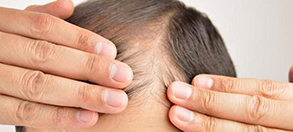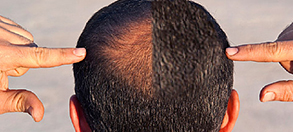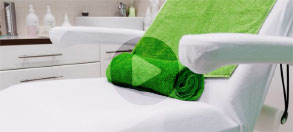An infected hair follicle, also known as folliculitis, is when a hair follicle becomes inflamed. All of the hair on the body grows out of what is essentially a small pouch referred to as a follicle. Because most of the body has hair, folliculitis can occur just about anywhere on the body but is most common on the back, arms, legs, buttocks, and around facial hair. Folliculitis can occur due to bacteria as well as yeast or other types of fungus.
There are several different causes of infected hair follicles. Wearing clothing that rubs against the skin, and shaving are two common causes of folliculitis. It is also common for hair follicles to become clogged by oils, sweat, or makeup. When the hair follicles are irritated or injured, they are more likely to become infected. Folliculitis is often more common in those who wear tight clothes, deal with substances that can block follicles, have some type of infected wound, or use a pool or hot tub that is not treated properly.
There can be various symptoms that can indicate a hair follicle infection. Folliculitis often looks like red pimples with a hair in the middle of them. These pimples may or may not be filled with pus. They are often itchy and can cause a burning sensation. When the pimples caused by folliculitis burst open, they can drain blood, pus, or both. While hair follicle infections are easily diagnosed by doctors, they may want to do further tests to determine what exactly is causing the problem. To do this, a doctor may test a sample of tissue or the fluid in the infected pimples to learn exactly what the cause of the infection is.
Once a person has been diagnosed with folliculitis, it can be treated. If mild, the infection will likely heal on its own within two weeks time. A doctor may recommend the use of warm compresses made with saltwater to help ease any itching and facilitate the healing process. People suffering from folliculitis in facial hair or on the scalp may be advised to use a medicated shampoo to help with treatment. If the infection does not clear up on its own, a doctor should be seen. If the hair follicle infection continues to spread or comes back, or if the affected area becomes swollen, red, and more painful, a doctor should also be seen. People that suffer from folliculitis that reoccurs or does not go away may benefit from laser hair removal treatments as they can destroy the hair follicles, keeping them from becoming inflamed.
There are several different types of folliculitis. Mild forms include bacterial, “hot tub,” barber’s itch, and pityrosporum. Mild forms of hair follicle infection are marked by small, pus-filled blisters but generally will clear up on their own. There are also more severe types of folliculitis known as deep folliculitis, in which the entire hair follicle in involved. Deep folliculitis types include gram-negative, sycosis barbae, eosinophilic, and boils or carbuncles. The various forms of deep folliculitis are more likely to have to be treated by a doctor as they generally involve deeper, more severe infections. Doctors will often prescribe antibacterial creams, oral antibiotics, and topical antibiotics. Treatment depends on the form of folliculitis being dealt with.
Some people may be more prone to skin and hair follicle issues than others, but there are preventative steps that can be taken to decrease the likelihood of developing folliculitis or having it spread. Showering or bathing daily and using a mild soap can prevent infections. After showering or bathing, a clean towel should be used, especially if already dealing with a hair follicle infection. Those suffering from a hair follicle infection should avoid scratching the area, as well as shaving the affected area. If shaving is unavoidable, a new blade should be used each time.
Continue learning about hair follicle infections by visiting the following pages:
- Folliculitis Symptoms & Types
- Skin Problems & Treatments – Folliculitis
- Management of Bacterial Infections of Hair Follicles
- AOCD – Folliculitis Explained
- Inflammation of Hair Follicles
- What is Folliculitis?
- Folliculitis Treatment and Management
- Folliculitis and Skin Abscesses
- Children and Folliculitis, Boils, and Carbuncles
- Medical Reference Guide – Folliculitis
- Bacterial Folliculitis
- Folliculitis, Boils, and Carbuncles
- Folliculitis Examples
- Hair Follicle Infection Prevention
- Get Health Answers – Folliculitis Symptoms
- Folliculitis Causes, Treatment, and Prevention
- Symptoms of Staphylococcal Skin Infections
- Dealing With Ingrown Hairs


